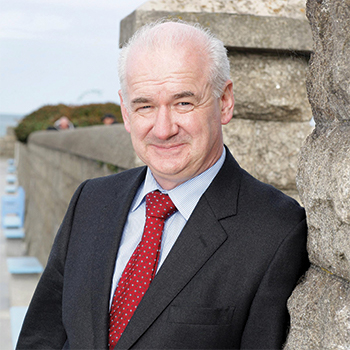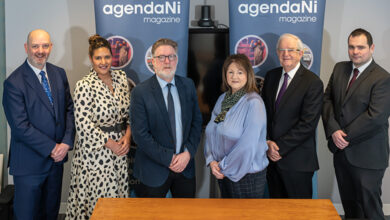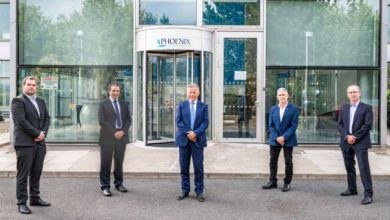Infrastructure investment: a key economic enabler post-pandemic
Grant Thornton hosted a virtual round table discussion, bringing together stakeholders in both the public and private sectors, to discuss the importance of infrastructure investment as a means for Northern Ireland to recover from the Covid-19 pandemic.
How important is infrastructure investment as an economic driver? What sectors are particularly reliant on good quality infrastructure?
Paul Stapleton
Infrastructure is fundamental for all aspects of society. The economy relies on having modern, effective, and functioning infrastructure in any sector you can think of. As we emerge from the pandemic, we must compete harder than ever to attract inward investment into Northern Ireland. Having effective infrastructure is a key part of that. Infrastructure itself is also a huge stimulus; investment in infrastructure makes a huge contribution to the economy. It is fundamental to the economy and society overall.
John Ahern
Infrastructure investment cannot be neglected. It is a key driver for productivity and therefore competitiveness, but new infrastructure can also unlock new economic opportunities for further growth. Look at the countries around the world investing big percentages of their GDPs: China is way out ahead of everyone else and the UK is much lower in those rankings. We see how economic growth can be driven by infrastructure; one follows the other or one can stymie the other.
Jenny Green
We know that every sector is reliant on good infrastructure, it underpins everything that we do in our society, ensuring that we’re constantly improving our quality of life and giving our citizens the opportunities that they deserve. We typically look at economic infrastructure, but we need to look at social infrastructure as well because there is not a government department here that isn’t impacted by infrastructure. To be able to drive success across all the sectors, we need to make sure we have a collective vision for what we want our society to be and that’s what ICE is trying to focus on at the moment. The question is: what does our leadership envisage and how can infrastructure support that? It cannot be looked at in a sector-by-sector sense, leaving us to fight over pots of money.
Ronan Larkin
Well-functioning infrastructure is the backbone of any economy, be it growing or prosperous. Our economy is certainly going to come under increased pressure in these next two-to-three years post-Covid-19. If we take it back to water and drainage infrastructure: water is essential for everything we do, whether it is at home or in the workplace. 21st century drainage that is able to connect and take on board new housing or businesses is vital. One of the challenges we face is bringing that together and ensuring it is funded.
Clare McKeown
The UK Government’s net zero carbon 2050 target now gives us a powerful policy tool to send long term signals to invest in integrated infrastructure, reducing waste and increasing efficiencies. What we see globally, are the most progressive cities using innovation to integrate infrastructure, making it more efficient. For example, waste to energy systems are generating renewable heat and renewable electricity which is used in turn to power cleaner electric vehicles, so less waste and cleaner power. Decarbonisation combined with digitalisation are the new enablers, what we must do is invest in people with these skills sets to enable the infrastructure and in turn the economy to flourish.
Jim Mackinnon
It is certainly critical that you have enough affordable housing to support your economic and employment objectives. Let’s not forget the importance of broadband, which will be vital for our enterprises of the future. We are all in the same space as far as that issue is concerned.
It’s inarguable that infrastructure can either enable and amplify economic goals or stop them dead in their tracks.
— Andrew Webb, Chief Economist, Grant Thornton, Belfast
Andrew Webb
It’s inarguable that infrastructure can either enable and amplify economic goals or stop them dead in their tracks. It is just in that point of inflection where we wonder if infrastructure will hinder us as we try to achieve smart cities and grow the population of Belfast. Can that happen if the wastewater treatment infrastructure isn’t ready? The multiplier effects of infrastructure development can be crucial because you have the immediate impact of the construction phase filtering through to the wider economy, into leisure and retail spend. Then, in the operational phase, it supports the day-to-day activity of the economy, so it is absolutely crucial to our economic ambitions.
What needs to be done to facilitate infrastructure investment in Northern Ireland?
Paul Stapleton
The key enablers for successful delivery are policy, funding, an effective planning process, community engagement and the right skills. It must begin with policy, if you don’t have clear policy from the Executive, it’s very hard to make progress on the other elements. It has been encouraging recently to hear members of the Executive, like ministers Dodds and Mallon, talking about the importance of infrastructure in a green recovery post-Covid-19. We need the same urgency we showed in dealing with the pandemic to deal with the consequences arising from it. If we make the right decisions in 2020, we can put shovels in the ground in 2021.
Jim Mackinnon
We talked about the importance of strategy and policy, but I think, as became clear during the Covid-19 crisis, a lot of these noble aims and ambitions fall down in their implementation. Words can be quite cheap. In Scotland the National Planning Framework identifies infrastructure projects and associated locations. After some debate, the Parliament agrees the need and principle for the project so that further consideration focuses on points of detail not the rationale or justification. A strategy and an action plan, rather than vague promises, is what is needed in order to move forward and make clear the direction of travel for Northern Ireland.
Jenny Green
ICE has been doing a lot of work looking at global best practice for infrastructure. We released a piece of work last year called Enabling Better Infrastructure and one of the key recommendations within it was identifying three key stages of infrastructure development, the first of which is a national vision for infrastructure followed by a national needs assessment. We are releasing a report at the end of this month, recommending that the Executive establish an independent infrastructure advisory body to lead us into a holistic approach, moving us beyond local decisions.
Andrew Webb
What we have found over time is that maturity and bravery are required for these actions. There are well documented instances of politicians on picket lines against projects because they’re locally controversial and later finding themselves in ministerial positions making the key decisions. In Northern Ireland, everything is local, so if we can mandate this decision making to an independent body and give it the autonomy it needs, it can mitigate the localism.
John Ahern
There must be a vision. We invest in many countries around Europe and we look at two things first: that they know where they are and that they know where they are going. Northern Ireland is somewhere in the middle of answering those questions. It scores well as having great potential, but it has gaps in its vision and lacks a plan. It is competing with countries with advanced plans for investment; countries that have prepared for inward investment. Greater certainty is needed, people need to be told in a timely manner if they are going to get planning or not.
Ronan Larkin
Northern Ireland Water probably has enough policy for water and drainage from government to allow us to get on with our role in the meantime; the challenge faced by our Executive and our regulator is ensuring sufficient medium term financing and funding is put in place to underpin our PC21 business plan with investment money. We have produced a strategy document up to 2046 that puts out our vision for water and drainage. We have submitted our PC21 Business Plan to the regulator and will get a determination back in September this year. Our plan is about starting to move away from the situation of economic constrained areas where development is halted because of a lack of investment in drainage infrastructure and waste water treatment. We need to ensure this is underpinned with funding to facilitate our £2.5 billion six-year plan. People have talked about the trickle-down effect of infrastructure spending; for every pound NI Water invests, there’s a further spend of two to two and a half times in the Northern Ireland economy.
Funding a ubiquitous high speed broadband service is an equally a key enabler for reducing our carbon footprint.
— Clare McKeown, Sustainable Development Manager, Belfast City Council
Clare McKeown
Belfast City Council’s new Resilience Strategy focuses on shocks and stresses in the city which weaken the economy in the long-term. These relate primarily to the energy, transport, power and health infrastructures. Knowing this I’d like to raise our vision. The UK Infrastructure Commission’s advice to the UK Government is for a ‘Marshall Plan’ for low carbon and digital sector enhancement to bring us to that net zero future. We do need to give this serious consideration. But how? We do have some success stories. We are now importing approx. 50 per cent renewable electricity onto the grid. That happened because innovative technology, combined with a clear policy and a structured funding mechanism came together. If we can harness and replicate that approach, then it’s the way forward. I would encourage the Government to be bold here. We could be facing into long term recession and we need a sharp focus on a stimulus in those sectors to make things happen.
How should the planning process to reformed to support future infrastructure investment?
The key challenge for Northern Ireland is to put the right models in place to enable and unlock the private funding.
— Paul Stapleton, Managing Director, NIE Networks
Paul Stapleton
Planning is key. Often NIE Network projects are investment enablers for wind projects, waste projects and industrial developments seeking to connect to the electricity network. If we cannot complete our project, the planning process could be holding up associated investment on a scale that is ten times greater.
As an infrastructure provider, timeliness and consistency are our two key asks of the planning process. While there are many benefits of decentralised planning across individual councils, there are also disadvantages, particularly when attempting to deliver national infrastructure in a coordinated manner. Looking at a more centralised and holistic view of infrastructural needs and planning might provide a more cohesive solution.
Ronan Larkin
We do not want to be an obstacle to development in any shape or form. We have been examining our own internal process to determine what we have to do to facilitate developers in delivering their schemes. This is becoming much more digitised, enabling individuals to access and track their development process from application for a network connection all the way through to the endpoint. There is an opportunity right now to take the planning authorities planning portal and make it a much more accessible and digitised tool and there are sufficient companies with digital and coding skills in Northern Ireland right now to make that happen. How can we all be assured that is happening at an efficient pace?
Jenny Green
The lack of digitisation in the planning process has been exposed by the Covid-19 lockdown. If there was a holistic approach to the planning, even if the decisions continue to be taken at a local level, guidance could be issued to the local authorities, the developers and clients to assist with targeting development in a particular way. That would help to make projects more agile.
John Ahern
A planning application can require years of preparation and millions of pounds. A system whereby you’re waiting on a Saturday news report to determine which minister will be deciding your project’s fate is not good. Imagine trying to explain to your masters back in Belgium that you can tell them on Saturday which minister we got and whether we’re going to get planning or not. That’s not the kind of country that people are going to invest in. It needs to be based on something broader than an individual. A good minister or a bad minister; that’s a lottery. That’s not how you develop infrastructure.
Andrew Webb
Since RPA, the planning system leaves a lot to be desired. We hear a lot of frustration from those at the coalface who believe that the centralised system was more effective. The lockdown exposed this and will hopefully trigger a rethink. At the same time, while the planning system has its flaws, the infrastructure deficit here is so significant that it could hinder everything else. As such, the finance deficit is perhaps even more significant.

Grasp the immediacy of this and through robust and efficient decision making, planning must become something that will sustain the economic recovery, rather than obstruct it.
— Jim Mackinnon, Former Chief Planner Scotland
Jim Mackinnon
The Northern Ireland Planning Service and wider planning system do not have a good reputation. If you look at the figures, five years after the transfer of powers, there are no up-to-date local plans in Northern Ireland for use and adoption by the new local authorities. These plans are supposed to guide development. For major planning applications, there is a target of 30 weeks for the determination of an application. However, it takes most councils between 55 and 60 weeks. That’s not very encouraging.
I have also experienced the IT system for planning in Northern Ireland. To say it is Heath Robinson-esque is to overstate how good it is. It is really clunky, both from the perspective of the public using it and also those accessing it in the local authorities. It does not meet the needs of the Planning Service or Northern Ireland.
How should infrastructure investment be funded? What role should the private investment have in funding infrastructure?
Andrew Webb
I don’t have a full shopping list of everything that needs to be expended to make our infrastructure fit for purpose but it’s in the many billions of pounds when you think about road schemes, energy plants, water and sewage and everything else. We must think about different ways of funding beyond the traditional stumping up of cash by government. One cause for hope is that we’re in a UK Government context where there is talk of an ‘infrastructure revolution’, so you would hope that could lead to a stream of infrastructure money coming from the centre post-Covid-19. Northern Ireland must move beyond a reliance on what Westminster does. There’s an opportunity to bring in private money as well, similar to the Private Finance Initiative in Scotland and Northern Ireland could also tap into its vast diaspora for novel ways to raise money.
Jim Mackinnon
The Private Finance Initiative is regarded as a better alternative to PPP, though it is not without its own challenges. I agree with the sentiment that a cocktail of funding sources will be the way ahead.
Jenny Green
We are limited by the nature of the block grant. Political opinions around funding for infrastructure need a rethink if we’re going to drive things forward at the speed that we need to because there’s just not going to be enough. We know money needs to be spent on healthcare and education and we need to make it clear to the leadership that infrastructure isn’t separate from those investments. It’s such a good stimulus for recovery, which we know we will have to face in a serious way. One of the things ICE has called for is the consideration of another low interest loan source similar to the European Investment Bank, perhaps a UK investment bank.
John Ahern
Indaver has a strong balance sheet and is in a strong position to fund any project it’s involved in. To touch on the Private Finance Initiative, there are positive stories. Indaver was involved in a project in Aberdeen which took only two and a half years from the bid starting to the contract being awarded. The project for Arc21 has been going for 12 years already and hasn’t even received planning permission yet. Meanwhile, there is significant investment available from institutions. For example, pension funds are very keen on infrastructure investment because it aligns with what they need. Usually, the big institutions will get involved in a serious way once you have planning permission. Northern Ireland suffers from a bad reputation in that area and has to compete with the rest of the world for this investment.
Water is essential for everything we do, whether it is at home or in the workplace. 21st century drainage that is able to connect and take on board new housing or businesses is vital.
— Ronan Larkin, Director of Finance and Regulation, Northern Ireland Water
Ronan Larkin
NI Water goes through the same process and scrutiny here as occurs in England and Wales. We’re much more efficient than we were 10 years ago and delivery is much leaner. Our regulator has confirmed the efficiency gap between NI Water and the UK Water companies has pretty much been closed since 2007. Our Executive’s issue with funding is that they have to find it from within the block grant. All this money must be divvied up and portioned out. What Northern Ireland needs for its water and wastewater needs is investment, rather than waiting around for decisions on how much is available. We need to find a way to access much more funding because the plan we have in place is required to future-proof Northern Ireland. If that falls behind it’s going to be very difficult to build up social housing or attract foreign direct investment and new industry and jobs.
Paul Stapleton
The reality we’re facing is that there will never be enough public money for all the challenges we are facing. The key challenge for Northern Ireland is to put the right models in place to enable and unlock the private funding. NIE Networks is an interesting model in that we’re a privatised infrastructure provider, but we’re also regulated. We fund investment off our own balance sheet but undertake programmes as determined by the regulator and at rates determined by them. So its private capital delivery public policy. That’s a model that works very well. All of the energy shift to renewable sources was essentially funded by private capital because the right policy and guidelines were there.
How should infrastructure investment be more sustainable? How important will ‘green’ infrastructure investment be in the future, particularly with the challenge of climate change?
Clare McKeown
Investment in green infrastructure is crucial to reach the net zero carbon target. Already we are seeing capital being repurposed globally as record levels of investment are directed into renewable energy and battery storage, electric cars, hydrogen buses and cleaner fuels etc. We are also seeing the relevance of investing in natural capital and investing in skills. This all helps to bend the emission curve and in the process generates jobs and prosperity.
One silver lining of Covid-19 is that it has given us a unique opportunity to test e-commerce, e-learning, e-fitness, e-health etc. These digital innovations are a key enabler to reduce our carbon footprint and could help change our behaviour permanently. So funding a ubiquitous high speed broadband service is an equally a key enabler for reducing our carbon footprint. We are likely to see a sharp focus on these issues as COP 26 approaches.
We typically look at economic infrastructure, but we need to look at social infrastructure as well because there is not a government department here that isn’t impacted by infrastructure.
— Jenny Green, Regional Director, Institution of Civil Engineers (ICE)
Jenny Green
The Oxford Smith School of Enterprise and the Environment analysed 196 fiscal policies following the 2008 economic crisis and concluded that green stimulus packages offer higher economic multipliers. That is important to acknowledge. In the context of net zero target for greenhouse gas emissions by 2050, Northern Ireland has fallen behind in creating policies conducive to this.
Likewise, the OECD is advocating a green recovery and argues that economic stimulus packages should be aligned with climate action and mitigation policy. Emerging from this crisis, we have to approach the challenges from the right angle.
Andrew Webb
We went into this crisis believing that society would be fundamentally changed and that there would be opportunities to do things differently. Over time, I’ve grown uneasy that the rhetoric will not be matched with action. I hope this doesn’t happen because we have an opportunity now to grasp the green agenda and see it for what it is: a significant economic boost.
Paul Stapleton
For NIE it’s about enabling clean energy. There are many reasons to be optimistic, including the recent soundings from the Executive which has clearly identified the potential of the green recovery.
The challenge will be to put that intention into action and the most important thing now is fostering a sense of urgency. I don’t think that we have yet fully appreciated the impact that this pandemic has had on the economy. Now is the time to make policy decisions, removing obstacles from green infrastructural investment so that we can spend capex and have shovels in the ground in 2021. It’s not simply an opportunity, it’s an absolute necessity from an economic perspective.
I hope for a green revival. Never waste a good crisis. Covid-19 showed us that decisions that were assumed to be ‘impossible’ were in fact possible.
— John Ahern, Executive Chairman, Indaver Ireland & UK
John Ahern
I hope for a green revival. Never waste a good crisis. Covid-19 showed us that decisions that were assumed to be ‘impossible’ were in fact possible. There is a huge willingness among institutions to invest in green economies. We need action now. The UK economy shrank by 20 per cent in April 2020 and if that’s not a wakeup call then I don’t know what it is we’re waiting for.
Jim Mackinnon
We all aspire to a greener economy and a more sustainable way of living. However, when the realities of what this can mean become apparent in terms of new infrastructure, such as charging points or turbines, there is often local controversy and appeals. We must grasp the immediacy of this and through robust and efficient decision making, planning must become something that will sustain the economic recovery, rather than obstruct it.
Ronan Larkin
The economics can work in Northern Ireland. There is a legislative target of net zero carbon emissions by 2050 and Northern Ireland must achieve this and there is much to be done. From our own perspective, the strategy that Northern Ireland Water has in place reflects its objective of decarbonisation. We are a significant energy user and want to ensure that we contribute to the 2050 target. Meanwhile, financiers are moving money away from fossil fuels and into renewables.
Round table participants
John Ahern
John Ahern joined Indaver, a waste management company, as Managing Director in 1995 with responsibility for the Irish and UK market. He has overseen the growth of Indaver in Ireland which has become one of the country’s leading waste companies. Today, John is the Executive Chairman of Indaver’s Ireland and UK activities with responsibility for the development of waste-to-energy plants across the region. Prior to joining Indaver, John worked in the LPG gas industry in Britain and Ireland for 15 years.
Jenny Green
A chartered civil engineer, as Institution of Civil Engineers (ICE) Regional Director Jenny Green is responsible for working with more than 2,000 ICE members in NI, enhancing their knowledge, promoting their expertise and helping the public better understand infrastructure. She works with a wide range of industries, representative bodies, civil servants and politicians, to reinforce the importance of infrastructure to our quality of life.
Ronan Larkin
Ronan Larkin is a chartered global management accountant and an associate of the Chartered Institute of Management Accountants (CIMA). He joined Northern Ireland Water as Director of Finance in 2005 and in 2019 became the lead for the development of Northern Ireland Water’s programme for Commercial Excellence. Ronan is a council member of Water UK and is President of the Institute of Water Northern Ireland.
Jim Mackinnon
Jim Mackinnon graduated with first class honours in geography and a diploma in town planning with distinction before joining the former Scottish Office in 1979. He held various positions before being appointed Chief Planner and Director for the Built Environment in 2000. Since retiring in 2012, Jim has undertaken a range of consultancy work, including a spell as Director of Planning for Belfast City Council as well reviews of the planning services in Newry, Mourne and Down as well as Ards and North Down councils.
Clare McKeown
Clare McKeown is Sustainable Development Manager at Belfast City Council. She has been at the forefront of sustainable development policy implementation for almost two decades at both local and national level, as Senior Policy Advisor with the UK Sustainable Development Commission in Northern Ireland and subsequently Head of the Whitehall Team. She is an honorary fellow of Queens University and board member of BITC.
Paul Stapleton
Paul joined NIE Networks as Managing Director in May 2018. He is a committee member of the Institute of Directors in Northern Ireland and a director of the UK Energy Networks Association and of E.DSO (European Distribution System Operators). He joined ESB in 1991 and held a number of senior management positions including General Manager of Electric Ireland, ESB Group Treasurer and Financial Controller of ESB Networks Limited. He is a member of the Chartered Institute of Management Accountants.
Andrew Webb
Andrew Webb is Grant Thornton’s Chief Economist where he leads the firm’s work on a wide range of economic advisory assignments across the public and private sector. Andrew specialises in local economic development and has developed several growth plans for local councils. He is a board member of Action Renewables, Chair of Belfast City Centre Management and is a recently elected Fellow of the Institute of Place Management.












